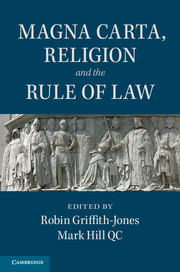Book contents
- Frontmatter
- Contents
- List of contributors
- Preface and acknowledgments
- I Introduction
- II The birth of Magna Carta and the spread of its principles
- III Comparative religious approaches to Magna Carta's rule of law
- IV The contemporary inheritance of Magna Carta
- 15 The development of human rights thought from Magna Carta to the Universal Declaration of Human Rights
- 16 Strasbourg's approach to religion in the pluralist democracies of Europe
- 17 The Great Covenant of Liberties: biblical principles and Magna Carta
- 18 The cardinal rule of religion and the rule of law: a musing on Magna Carta
- 19 Strengthened by the rule of law: the message of Magna Carta for religions today
- Appendix The Charters in translation
- Bibliography
- Index
18 - The cardinal rule of religion and the rule of law: a musing on Magna Carta
from IV - The contemporary inheritance of Magna Carta
Published online by Cambridge University Press: 05 May 2015
- Frontmatter
- Contents
- List of contributors
- Preface and acknowledgments
- I Introduction
- II The birth of Magna Carta and the spread of its principles
- III Comparative religious approaches to Magna Carta's rule of law
- IV The contemporary inheritance of Magna Carta
- 15 The development of human rights thought from Magna Carta to the Universal Declaration of Human Rights
- 16 Strasbourg's approach to religion in the pluralist democracies of Europe
- 17 The Great Covenant of Liberties: biblical principles and Magna Carta
- 18 The cardinal rule of religion and the rule of law: a musing on Magna Carta
- 19 Strengthened by the rule of law: the message of Magna Carta for religions today
- Appendix The Charters in translation
- Bibliography
- Index
Summary
Magna Carta: muse and mentor was the title of the exhibition in Washington, DC preparing the way for this 800th anniversary, featuring Lincoln Cathedral's copy of the 1215 Charter. In this chapter, I consider the fate of the Charter's opening clause and the reinforcement offered to it, so far to little avail, by the Human Rights Act 1998. There is rich scholarship in the historical and religious studies in this book's three preceding sections. After any such weighty trilogy, the dramatic festivals of the Greeks turned to a lighter muse for their critiques of contemporary public life. In the last century, a great British comedy moment asked a tragic question about the fate of Magna Carta: did she die in vain? In musing on this, my call is for our constitution's updated version of Magna Carta's opening clause to become a mentor to the courts.
When the same instantiation had returned from its wartime sojourn in the USA, a civil servant feared the dramatic power of Magna Carta, sensing ‘a danger that the Colonial peoples might be led into an uncritical enthusiasm for a document which they had not read but which they presumed to contain guarantees of every so-called “right” they might be interested … in claiming’. In my opinion, however, it would be no tragedy if people of diverse faiths were to mark this 800th anniversary by celebrating the right to freedom of religion. Articulated memorably but narrowly in the opening clause of Magna Carta, its contemporary reincarnation is a broader but less well-known provision of the Human Rights Act 1998, namely section 13. This could be the deus ex machina which resolves the many tensions now coming before the courts and Parliament between freedom of religion and other human rights.
The law on freedom of religion as influenced by Cardinals Langton and Hume
The opening clause of Magna Carta in 1215 was incorporated into statute law in 1297 and remains in force today. Its declaration ‘quod Anglicana ecclesia libera sit’ is traditionally translated as ‘that the English church shall be free’. It owes much to Cardinal Stephen Langton, Archbishop of Canterbury in 1215.
- Type
- Chapter
- Information
- Magna Carta, Religion and the Rule of Law , pp. 314 - 333Publisher: Cambridge University PressPrint publication year: 2015
- 1
- Cited by

